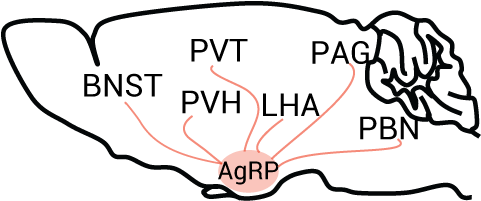Research projects
The ASH Lab seeks to understand the basic neurobiology of feeding behavior, with an emphasis on identifying the neural circuit pathways underlying susceptibility to under- or over-nutrition.
under-nutrition
How do we choose how and when to eat in times of food scarcity? When energy levels are depleted, individuals must choose food intake over other, perhaps more salient, motivational drives. The lab seeks to determine how evolutionarily conserved neural circuits can become disrupted in response to food deprivation, with the hope to identify neural targets for diseases associated with anorexic behavior.
food choice
Why are some foods so palatable to certain individuals, but not others? Food enriched in fat, sugar, and processed ingredients is exceptionally prevalent in Western society, especially in areas with limited access to local farms. However, significant individual variability exists in preference for these diets in both humans and animal models. We seek to leverage the individual variability of food preference to further our understanding of the neural basis of food-related decision making in environments with access to varying types of food.
Our Approaches
behavioral measurement
We leverage open-source strategies in an attempt to mimic ethologically-relevant conditions in the lab, and subsequently measure relevant behaviors (e.g. feeding, hyperactivity, operant, social).
circuit neuroscience
We combine state of the art molecular, genetic and viral reagents to further understand how specific cell types and projections coordinate complex behaviors.
Detection & modulation of neural circuits
We use cutting-edge neuroscience techniques to measure and alter neural activity in behaving animals (e.g. in vivo calcium imaging and opto/chemo-genetics) to determine the causality of neural circuit activity in feeding-related behavior.






